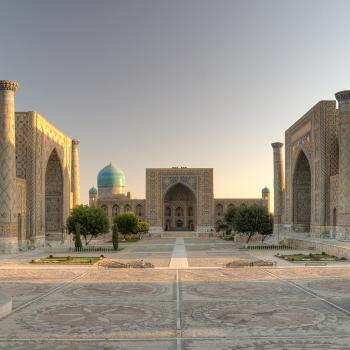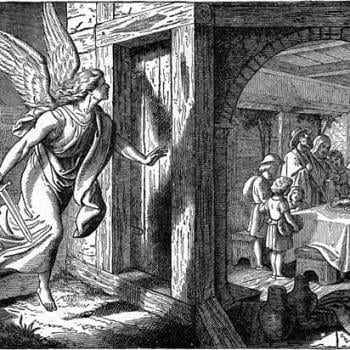Such lines are potent and poignant precisely because of their "real-ness," their honesty and directness. Buddhism, while typically not appealing to a separate being as ultimate or supreme, nonetheless is rich with poetry that refreshes by its frank humanity, too; note, for example, the following poem by Ikkyu, "A Meal of Fresh Octopus":
Lots of arms, just like Kannon the Goddess;
Sacrificed for me, garnished with citron,
I revere it so!
The taste of the sea, just divine!
Sorry, Buddha, this is another precept I just
cannot keep.[6]
Frank expressions, artistic or otherwise, of authentic human experience is always connecting; the resonance we may feel in such expression in the world's sacred poetry builds a kind of kindred community that cuts across centuries and illumines similar struggles that we experience on our own path. To return to the Hindu tradition, McDermott adds the following concerning the blunt directness of the poets:
Even the most pungent comments, however, belie a deeper commitment. In spite of her demeanor, the poets refuse to let go of their Goddess, crying that, if nothing else, their steadfast devotion to her kinder side will save them in the end. As such, it is they who are the moral victors in these particular songs.[7]
While perhaps we don't need to step into a self-satisfied moral stance vis-à-vis God—one need only remember the story of Job, who, in the end, was humbled by the majesty and ultimate incomprehensibility of God—we might take comfort in the blunt and gutty honesty in much sacred poetry, including that which expresses bewilderment or even anger before the divine. God is not a china doll. He/she can take it. In such poetry, we are reminded of the bald-faced honesty and emotional nakedness required in any authentic relationship, including relationship with the sacred. Such transparency shapes the arc of the heart whose consummation is found in the embrace of the Beloved.
Author's Note: This article is taken from my forthcoming book, Praying with the Poets: Poetry of the Sacred in the World's Traditions.
Notes:
1) Devara Dasimayya was a 10th-century Virashaiva (Heroic Shaivism) in South India, a Hindu tradition dedicated to Shiva. The Virashaivas mounted a critique of and alternative to orthodox Hinduism hierarchically ordered by caste. A.K. Ramanujan, Speaking of Shiva (London: Penguin Books, 1973), 107.
2) Kumar Sambhucandra Ray was a mid-18th- early-19th-century Bengali devotee of the "dark" goddess, Kali. Rachel Fell McDermott, Singing to the Goddess: Poems to Kali and Uma from Bengal (Oxford and New York: Oxford University Press, 2001), 59.
3) Hafiz was a 14th-century Muslim poet-saint from Persia (Iran). Endowed with natural poetic gifts, these became a channel for his spiritual experience when he became a Sufi. His Divan (collected poems) is considered a masterpiece of Sufi literature. Daniel Ladinsky, I Heard God Laughing: Renderings of Hafiz (Walnut Creek, CA: Sufism Reoriented, 1996), 77.
4) McDermott, 52.
5) Psalm 13:1-2. New Jerusalem Bible: Standard Edition (New York: Doubleday, 1999), 616.
6) Ikkyu was a 15th-century monk from Japan known for his vigorous Zen spirit and robust lifestyle. John Stevens, Wild Ways (Buffalo, NY: White Pines Press, 2003), 65.
7) McDermott, 52.




